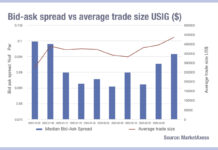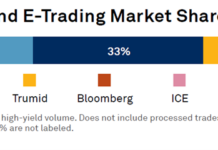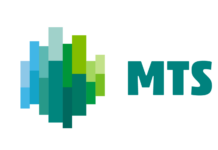
Market operator Tradeweb reports it has completed the first fully electronic institutional Secured Overnight Financing Rate (SOFR) swap spread trade. BlackRock and JP Morgan were counterparties to the trade on the Tradeweb Swap Execution Facility (TW SEF).
As markets globally transition from using IBOR rates toward a new reference rate, market participants have been accessing growing liquidity in alternative risk-free rates (RFRs) and have begun to trade increasingly in SOFR. In the US, the Alternative Reference Rates Committee (ARCC) has identified SOFR, which is administered by the Federal Reserve Bank of New York, as the rate that represents best practice for certain new USD derivatives and other financial contracts. In time, the increased adoption of RFRs including SOFR will help the market migrate away from IBOR.
Lee Olesky, CEO at Tradeweb said, “The global transition away from IBOR usage is a significant undertaking and is important to our market participants across various asset classes. Providing the tools and platforms that help foster electronic trading and coalesce liquidity around rates like SOFR is an area where we can be immediately helpful to our clients. We are proud to bring the full power of the Tradeweb platforms and network to bear as the industry moves toward critical deadlines.”
To help smooth the transition to new RFR rates, and in addition to offering trading, Tradeweb enables its clients to upload existing IBOR portfolios directly into the platform’s list trading tool and convert them to the new rates in a process that is designed to help achieve best execution.
Thomas Pluta, global head of linear rates trading at JP Morgan said, “As the ‘SOFR First’ date of July 26 rapidly approaches in the derivatives market, we are encouraging our clients to transition their trading away from LIBOR. Executing the first SOFR Swap Spread over Tradeweb is an important market milestone as SOFR liquidity and market volumes continue to grow.”
Market participants manage dollar interest rate risk chiefly through the treasury market, treasury futures, and interest rate swaps trading. A swap spread trade allows participants to transform interest rate risk expressed in the cash market to swaps, which also serves to link the liquidity between the two markets. This potentially provides investor and traders with optionality and surety as they transact and hedge each day. Swap spread trades are considered a structurally important segment of the interest rates derivatives market, and represent approximately 10% of the USD derivatives market.
Tradeweb launched interest rate swap trading in 2005, and numerous market firsts have been executed on the firm’s award-winning SEF, including the first electronic swap compression trade, electronic swaptions trading, electronic cleared inflation swap and multi-asset package trades.
©Markets Media Europe, 2021
TOP OF PAGE


























